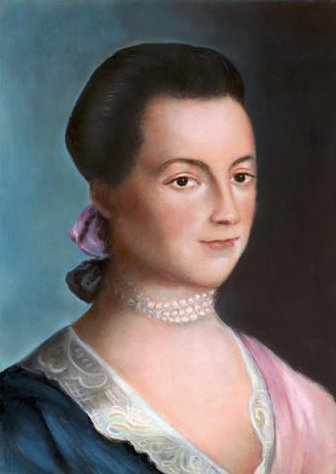
Abigail Adams, the earliest known image of her painted near the time of her marriage in 1764
Abigail Adams, born on November 22, 1744 in Weymouth, Massachusetts, was wife and chief advisor to John Adams, American founding father and second president; early advocate for women’s rights and opponent of slavery; self-taught intellectual; mother to many children including another American president; and a savvy and successful financial speculator. One reason why she remains among the most well-known figures in American history is the voluminous, well-preserved, witty, erudite, charming, highly personal, and utterly fascinating correspondence between her and her husband John. While she remained at home raising the children and managing their home, John was frequently away for extended periods on matters of revolution and state. Their letters are famous: they were loving and forthright with one other on a rare level, and the ideas and advice these two brilliant people shared with one another illuminate and inspire readers still.
Learn more about our wise and indefatigable founding mother Abigail Adams at:
Abigail Adams ~ by Beckett Graham and Susan Vollenweider for The History Chicks podcast
Abigail Adams ~ by Bonnie Hurd Smith for the Boston Women’s Heritage Trail website
Abigail Adams (1744 – 1818) ~ bio for the Adams National Historical Park, National Park Service website
Abigail Adams: American First Lady ~ by Betty Boyd Caroli for Encyclopædia Britannica
Abigail Adams: Revolutionary Speculator ~ Liz Covart interviews Woody Holton for Ben Franklin’s World: A Podcast About Early American History
Abigail Smith Adams ~ by Debra Michals for the National Women’s History Museum website
Correspondence Between John and Abigail Adams ~ Transcripts of over 1,100 letters, transcribed and digitized by The Massachusetts Historical Society
First Family: Abigail and John Adams ~ by Joseph J. Ellis for the Philadelphia Free Library
How Abigail Adams Proves Bill O’Reilly Wrong About Slavery ~ by David A. Graham for The Atlantic
John Adams ~ Miniseries by HBO, 2008
*A version of this piece was previously published at Ordinary Philosophy
~ Ordinary Philosophy is a labor of love and ad-free, supported by patrons and readers like you. Any support you can offer will be deeply appreciated!

